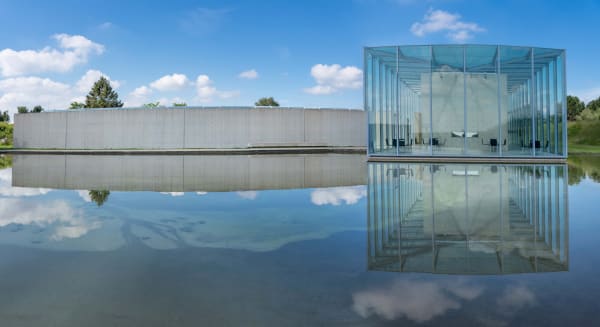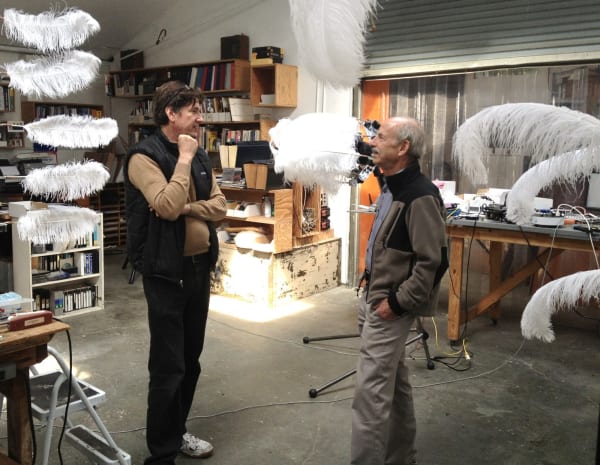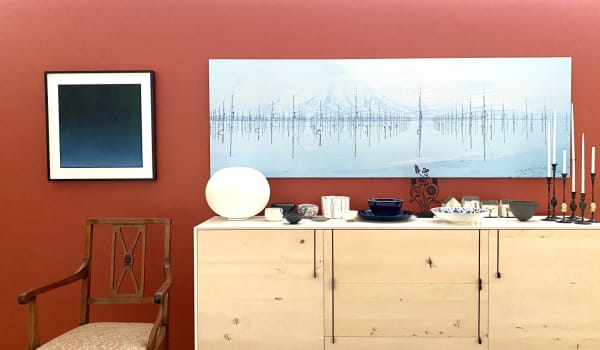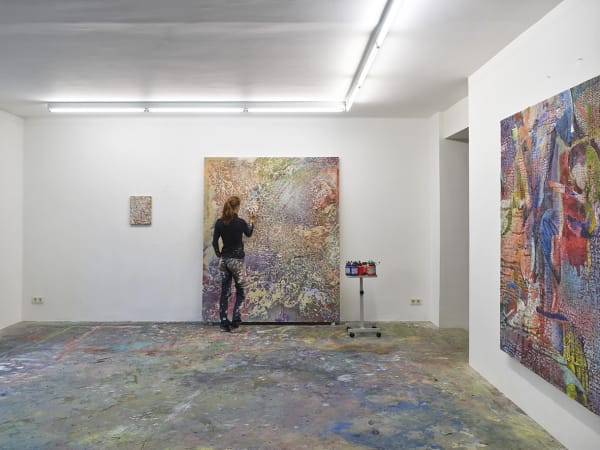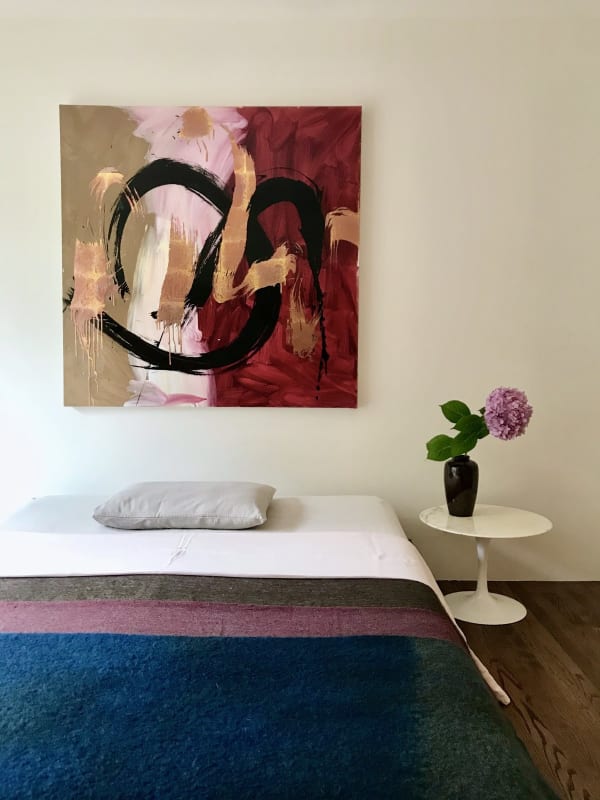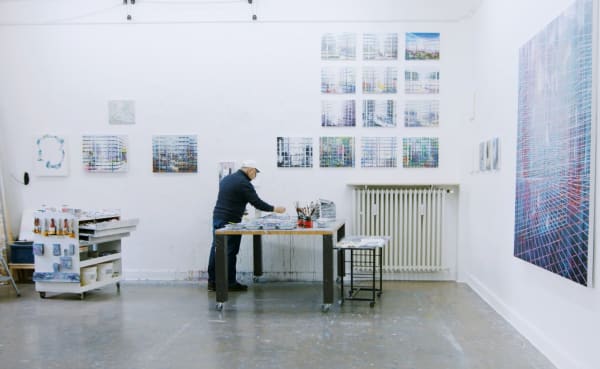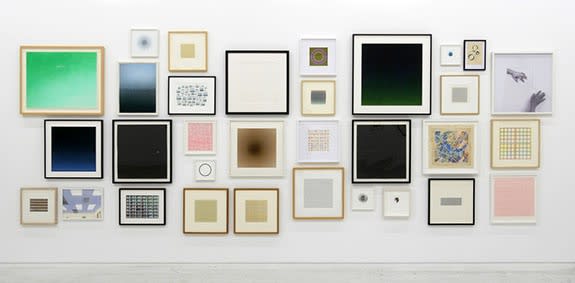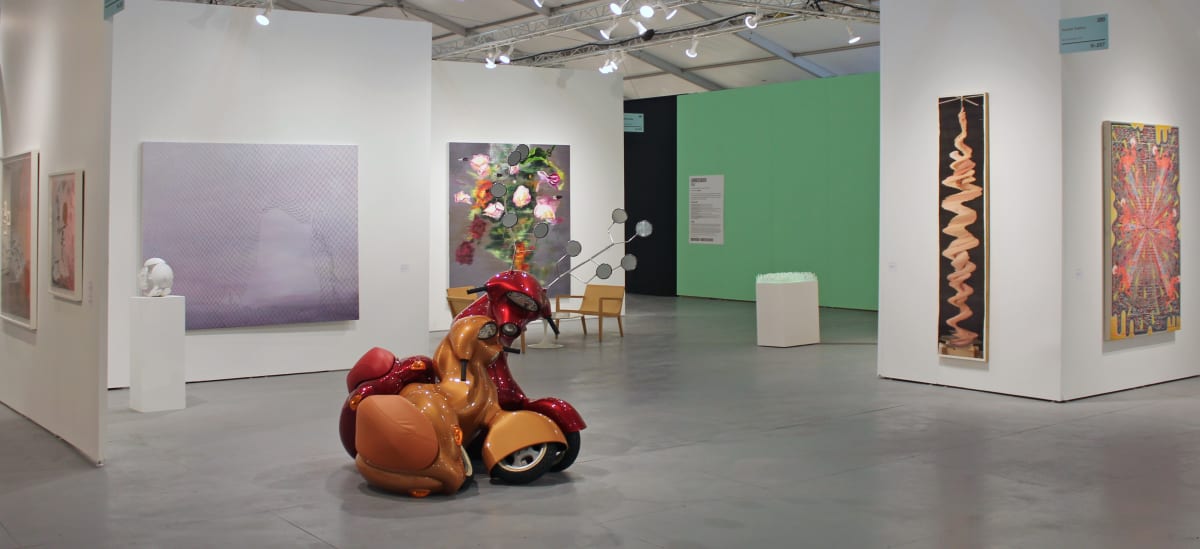Before immigrating to Europe and studying at the Kunstakademie in Düsseldorf, Algerian Driss Ouadahi studied architecture. His paintings of the ubiquitous high-rise, the legacy of Modern Architecture’s failed promise to improve the human condition, are renderings of impenetrable boundaries of steel, glass, and concrete.
Ouadahi’s imagery originates in part from the enormous public housing developments in Algiers that had been modeled on France’s habitation à loyer modéré (housing at moderated rents). In North Africa, these monoliths accommodate displaced rural populations; in Europe, they house immigrants from former colonies. They are symbols of the politics of class, religion, and ethnicity. Reminders of otherness.
In addition to the permutations of cityscape which Ouadahi has been exploring in the last few years, his work consists of two new types of paintings. The first are rigorously formal renderings of chain-link fencing that are both minimalist abstractions and a signifier of separation.
The second are depictions of tiled passageways, akin to subway systems like the Paris Métro. Fluorescent-lit and grimy, they are labyrinthian and claustrophobic. Ostensibly their purpose is movement from one place to another. But they feel more like blocked escape routes or morgues. They speak to restricted mobility in a supposedly global culture.
-
 Driss OuadahiGood Night, 2020oil on canvas63 x 70 7/8 in
Driss OuadahiGood Night, 2020oil on canvas63 x 70 7/8 in
160 x 180 cm -
 Driss OuadahiHors les Murs 2, 2020oil on canvas70 7/8 x 59 1/8 in
Driss OuadahiHors les Murs 2, 2020oil on canvas70 7/8 x 59 1/8 in
180 x 150.2 cm -
 Driss OuadahiTalking Space, 2020oil on canvas66 7/8 x 78 3/4 in
Driss OuadahiTalking Space, 2020oil on canvas66 7/8 x 78 3/4 in
170 x 200 cm -
 Driss OuadahiTrust me, 2012oil on canvas59 1/8 x 51 1/8 in
Driss OuadahiTrust me, 2012oil on canvas59 1/8 x 51 1/8 in
150.2 x 129.9 cm -
 Driss OuadahiClimb, 2015watercolor on paper22 x 30 in
Driss OuadahiClimb, 2015watercolor on paper22 x 30 in
55.9 x 76.2 cm -
 Driss OuadahiAnticipated Distancing 1, 2020oil on canvas15 3/4 x 18 1/2 in
Driss OuadahiAnticipated Distancing 1, 2020oil on canvas15 3/4 x 18 1/2 in
40 x 47 cm -
 Driss OuadahiAnticipated Distancing 2, 2020oil on canvas15 3/4 x 18 1/2 in
Driss OuadahiAnticipated Distancing 2, 2020oil on canvas15 3/4 x 18 1/2 in
40 x 47 cm -
 Driss OuadahiBetween Light and Shadow, 2020oil on canvas13 3/4 x 17 3/4 in
Driss OuadahiBetween Light and Shadow, 2020oil on canvas13 3/4 x 17 3/4 in
35 x 45 cm -
 Driss OuadahiFences hole 2, 2011oil on linen66 7/8 x 70 7/8 in
Driss OuadahiFences hole 2, 2011oil on linen66 7/8 x 70 7/8 in
170 x 180 cm -
 Driss OuadahiCommunion, 2020oil on canvas39 3/8 x 45 1/4 in
Driss OuadahiCommunion, 2020oil on canvas39 3/8 x 45 1/4 in
100 x 114.9 cm -
 Driss OuadahiDéambulation, 2020oil on canvas15 3/4 x 19 3/4 in
Driss OuadahiDéambulation, 2020oil on canvas15 3/4 x 19 3/4 in
40 x 50 cm -
 Driss OuadahiDeparture, 2015oil on canvas63 x 55 1/8 in
Driss OuadahiDeparture, 2015oil on canvas63 x 55 1/8 in
160 x 140 cm -
 Driss OuadahiExtra Muros, 2018oil on canvas74 3/4 x 66 7/8 in
Driss OuadahiExtra Muros, 2018oil on canvas74 3/4 x 66 7/8 in
190 x 170 cm -
 Driss OuadahiGouttes de Lumieres, 2019oil on canvas74 3/4 x 66 7/8 in
Driss OuadahiGouttes de Lumieres, 2019oil on canvas74 3/4 x 66 7/8 in
190 x 170 cm -
 Driss OuadahiFlying fence, 2016oil on canvas70 7/8 x 86 5/8 in
Driss OuadahiFlying fence, 2016oil on canvas70 7/8 x 86 5/8 in
180 x 220 cm -
 Driss OuadahiHot Night, 2010oil on linen43 3/8 x 51 1/4 in
Driss OuadahiHot Night, 2010oil on linen43 3/8 x 51 1/4 in
110.1 x 130.1 cm -
 Driss OuadahiLiquid Stone, 2019graphite on paper33 1/8 x 40 1/2 in
Driss OuadahiLiquid Stone, 2019graphite on paper33 1/8 x 40 1/2 in
84 x 103 cm -
 Driss OuadahiOppressed Blessing, 2016video2 minutes 27 seconds
Driss OuadahiOppressed Blessing, 2016video2 minutes 27 seconds -
 Driss OuadahiOppressed Blessing (3), 2016chalk pastel and fixative on paper15 3/4 x 39 3/8 in
Driss OuadahiOppressed Blessing (3), 2016chalk pastel and fixative on paper15 3/4 x 39 3/8 in
40 x 100 cm -
 Driss OuadahiPierre liquide, V, 2013graphite pigment and oil on canvas23 5/8 x 19 3/4 in
Driss OuadahiPierre liquide, V, 2013graphite pigment and oil on canvas23 5/8 x 19 3/4 in
60 x 50.2 cm -
 Driss OuadahiRandom tiles, 2016oil on canvas70 7/8 x 86 5/8 in
Driss OuadahiRandom tiles, 2016oil on canvas70 7/8 x 86 5/8 in
180 x 220 cm -
 Driss OuadahiRed on White, 2010oil on linen74 7/8 x 94 1/2 in
Driss OuadahiRed on White, 2010oil on linen74 7/8 x 94 1/2 in
190.1 x 240.2 cm -
 Driss OuadahiRecto-verso, 2020oil on canvas74 3/4 x 66 7/8 in
Driss OuadahiRecto-verso, 2020oil on canvas74 3/4 x 66 7/8 in
190 x 170 cm -
 Driss OuadahiRetour aux Sources, 2020oil on canvas27 1/2 x 31 1/2 in
Driss OuadahiRetour aux Sources, 2020oil on canvas27 1/2 x 31 1/2 in
70 x 80 cm -
 Driss OuadahiTemporary Friction, 2020oil on canvas70 7/8 x 63 in
Driss OuadahiTemporary Friction, 2020oil on canvas70 7/8 x 63 in
180 x 160 cm -
 Driss OuadahiUntitled (Subway I, Wuppertal-Barmen), 2018oil on canvas74 3/4 x 94 1/2 in
Driss OuadahiUntitled (Subway I, Wuppertal-Barmen), 2018oil on canvas74 3/4 x 94 1/2 in
190 x 240 cm
-

OFF THE GRID: Post-Formal Conceptualism
11 Apr - 20 May 2023This sprawling group exhibition traces the use of the form of the grid in contemporary art, beginning with some of its most illustrious mid-20th century proponents. From there, it examines...Read more -

Where We Are
23 Oct - 24 Nov 2021In a group exhibition marking this moment in history (and celebrating the 25th anniversary of Hosfelt Gallery) the work of 34 artists is employed to reflect on the zeitgeist of...Read more -

Driss Ouadahi
Revisited Spaces 17 Oct - 25 Nov 2020After having trained as an architect, Algerian artist Driss Ouadahi (b. 1959, Casablanca, Morocco) immigrated from post-colonial North Africa to study painting at the renowned Kunstakademie in Düsseldorf, Germany. Influenced...Read more -

BETWEEN THEM
An Installation Composed of Drawings 13 Jul - 17 Aug 2019Todd Hosfelt combines approximately 200 drawings in an installation designed to reveal thematic and conceptual relationships across time and place. In drawings spanning the 16th to 21st centuries, from European...Read more -

20th Anniversary Exhibition
Banerjee, Campbell, Crotty, DeFeo, Hawkinson, Higgins, Kürten, Lukas, Maggi, O'Reilly, Ouadahi, Piccinini, Porter, Pwerle, Rath, Rodriguez, Schoultz, Wiley, Basquiat, Cave, Hansen, Ruscha, Sikander, and Wilke. 9 Sep - 8 Oct 2016Hosfelt Gallery celebrates its 20th anniversary with an exhibition exploring what makes an artwork significant and lasting, and the qualities that distinguish the most innovative artists of our era. This...Read more -

Driss Ouadahi
Breach in the Silence 16 Jul - 20 Aug 2016Algerian painter Driss Ouadahi studied architecture before immigrating to Germany, where he continues to live and work. Utilizing a vocabulary of architectural motifs, Ouadahi makes large-scale paintings that borrow from...Read more -

Driss Ouadahi
Trans-Location 2 Feb - 23 Mar 2013trans- prefix 1. across: beyond: on the other side of 2. through Hosfelt Gallery will present 17 new paintings by Algerian artist Driss Ouadahi in his fourth solo exhibition at...Read more -

Look Both Ways
Banerjee, Campbell, Crotty, Danziger, DeFeo, Faruqee, Phungrasamee Fein, Haeckel, Hawkinson, Lukas, Maggi, O'Reilly, Ouadahi, Porter, Pwerle, Rath 8 Sep - 6 Oct 2012Hosfelt Gallery will inaugurate its new San Francisco venue with the group exhibition, Look Both Ways, opening at 260 Utah Street (at 16th Street) on September 8, 2012. Both a...Read more -

SEMI-PERMEABLE
Julie W. Chang, Jay DeFeo, Jutta Haeckel, Tim Hawkinson, Stefan Kürten, Crystal Liu, Emil Lukas, John O'Reilly, Driss Ouadahi, Janine Antoni, Luka Fineisen, Baseera Khan, Byron Kim, Naomie Kremer, Shahzia Sikander 28 Jun - 17 Aug 2012Hosfelt Gallery, New York Hosfelt Gallery’s summer group exhibition addresses the porous nature of identity and reality. Every living organism is encased by a semi-permeable boundary. This delicate, thin layer...Read more -

EINFLUSS: 8 from Düsseldorf
Haeckel, Jensen, Kürten, Lokai, Ouadahi, Völker, Ettlinger, Fineisen 18 Dec 2010 - 5 Feb 2011Introducing the Next Wave from Germany Part 2: San Francisco Panel discussion moderated by Laura Janku: Saturday 18 December, 2:30 pm Düsseldorf is the center of European art making because...Read more -

EINFLUSS: 8 from Düsseldorf
Haeckel, Jensen, Kürten, Lokai, Ouadahi, Völker, Ettlinger, Fineisen 19 Nov 2010 - 22 Jan 2011Read more -

Driss Ouadahi
Densité 30 Sep - 13 Nov 2010New York Gallery Before immigrating to Europe and studying at the Kunstakademie in Düsseldorf, Algerian Driss Ouadahi studied architecture. His paintings of the ubiquitous high-rise, the legacy of Modern Architecture’s...Read more -

In Full Color
Campbell, Chang, Faruqee, Haeckel, Liu, Lukas, Ouadahi, Rodriguez, Andrews, Grubin, Houge, Kremer, Mayer, Stenger 9 Jan - 7 Mar 2010New York Gallery John Andrews, Jim Campbell, Julie Chang, Anoka Farquee, Joan Grubin, Jutta Haeckel, Christian Houge, Naomie Kremer, Crystal Liu, Emil Lukas, Gerhard Mayer, Driss Ouadahi, Lordy Rodriguez, Jeremy...Read more -

New Work
Campbell, Faruqee, Lukas, Ouadahi, Porter, Horn, Stenger 1 Jul - 1 Aug 2009New York Gallery NEW WORK: Timothy Horn, Jim Campbell, Liliana Porter, Driss Ouadahi, Anoka Faruqee, Jeremy Stenger, Emil Lukas, and others.Read more -

Driss Ouadahi
Another Place, Another Me 20 Oct - 8 Dec 2007In his first solo exhibition on the West Coast, Düsseldorf-based painter Driss Ouadahi draws upon a lifelong interest in architecture to create a language of structure and abstraction. Layers of...Read more -

PATTERN VS. DECORATION
Chang, Danziger, Faruqee, Phungrasamee Fein, Haeckel, Higgins, Kürten, Liu, Ouadahi, Rodriguez, Adibi, Brand, Dopp, El Hanani, Grubin, Hackett, Hoferer, Mayer, Napangardi, Outlaw, Stenger, Wasson 12 Jul - 14 Aug 2007New York Gallery The “Pattern and Decoration” movement of the 1970s arose in response to the emergence of Minimalism and its strictures. It derived in part from Pop Art’s exuberant...Read more -

PATTERN VS. DECORATION
Chang, Danziger, Faruqee, Phungrasamee Fein, Haeckel, Higgins, Kürten, Liu, Ouadahi, Rodriguez, Adibi, Brand, Dopp, El Hanani, Grubin, Hackett, Hoferer, Mayer, Napangardi, Outlaw, Stenger, Wasson 16 Jun - 4 Aug 2007The “Pattern and Decoration” movement of the 1970s arose in response to the emergence of Minimalism and its strictures. It derived in part from Pop Art’s exuberant cultural mining and...Read more -

Driss Ouadahi
Unexpected Neighborhoods 23 Feb - 31 Mar 2007New York Gallery In his first solo New York exhibition, Algerian Driss Ouadahi paints lush, gridded abstractions that reference architecture found on the outskirts of urban Europe. Cities like Paris...Read more -

SONNTAG: Painting from Dusseldorf
Jutta Haeckel, Stefan Kürten, Driss Ouadahi, Bjorn Dressler, Stefan Heller, Glen Rubsamen, Stefan Wissel 29 Apr - 10 Jun 2006“Sonntag” means Sunday, and to me is the strangest day of the week.* Sundays are the traditional day of rest. They frequently entail amusement, recreation, family, reflection and religion. They...Read more
-

The Grid Revisited
David M. Roth, Squarecylinder, May 1, 2023 -

‘I Like Drawings”: A Conversation with Todd Hosfelt
Justin Manley, SquareCylinder, August 5, 2019 -

Studio Visit: Algerian Artist Driss Ouadahi Works in Düsseldorf
Bertram Müller, Rheinische Post, April 15, 2019 -

Driss Ouadahi, ‘Breach in the Silence’ at Hosfelt Gallery
Admin, SF Art Enthusiast, August 4, 2016 -

Driss Ouadahi takes on fences in latest exhibit
Jessica Zack, San Francisco Chronicle, July 13, 2016 -

Editorial Features: Driss Ouadahi
Chérie Louise Turner, Visual Art Source, March 23, 2013 -

Through Windows, Through Walls: Driss Ouadahi at Hosfelt Gallery
Maggie Haas, Daily Serving, February 27, 2013 -

Le plasticien algerien Driss Ouadahi expose a San Francisco
Le Temps d'Algerie, February 13, 2013 -

Driss Ouadahi: Trans-Location
Resonant City, February 11, 2013 -

Weekly Picks
Guardian Staff Writers, San Francisco Bay Guardian, January 29, 2013 -

‘If Walls Could Talk’ – interview with Rachida Triki
Rachida Triki, Ibraaz, May 24, 2012 -

Driss Ouadahi Show Sees Modern Life Filtered Through A Mesh
The National, February 26, 2012 -

Einfluss: 8 from Düsseldorf
Charissa Terranova, Visual Art Source, November 1, 2010 -
![Driss Ouadahi, "Untitled [j]," 2007, watercolor on paper, 9 5/16 x 13 5/16 inches](data:image/gif;base64,R0lGODlhAQABAIAAAAAAAP///yH5BAEAAAAALAAAAAABAAEAAAIBRAA7)
Galleries: The Paint Strokes Between Realism and Abstraction
Kenneth Baker, San Francisco Chronicle, December 1, 2007
-

HG Magazine Issue no. 40
July 27, 2022Summer Exhibition Guide - Part II Düsseldorf | Köln | Berlin | Venice | San FranciscoRead more -

HG Magazine Issue no. 22
Remembering Alan Rath 1959-2020; plus Rina Banerjee, Driss Ouadahi, Jean Conner, Lordy Rodriguez November 12, 2020Todd Hosfelt's and David Roth's tributes to Alan Rath Rina Banerjee receives a Joan Mitchell Foundation Grant In the Studio: Driss Ouadahi and Jean Conner...Read more -

HG Magazine Issue no. 21
William T. Wiley on View at SFMoMA; plus Gerrymandering panel discussion, Liliana Porter, Driss Ouadahi, Lordy Rodriguez, minestrone soup recipe October 29, 2020Panel Discussion: When Redistricting Becomes Gerrymandering -- Can Districts Be Drawn Equitably? Artwork Explained: Liliana Porter's Brancusi William T. Wiley: Con-Fusion-Ism on view at SFMoMA...Read more -

HG Magazine Issue no. 20
Upcoming Exhibitions: Lordy Rodriguez & Driss Ouadahi; plus Jutta Haeckel, Max Gimblett October 13, 2020Lordy Rodriguez: Polar Democracy Driss Ouadahi: Revisited Spaces New to Inventory: Jutta Haeckel Virtual Event: Max Gimblett & Lewis Hyde discuss The Disappearing Ox —...Read more -

HG Magazine Issue no. 19
Max Gimblett plus Jean Conner, Lordy Rodriguez, Driss Ouadahi, Liliana Porter October 2, 2020Anne Kirker explains of how the practices of meditation are relevant to Max Gimblett’s work Virtual Event: Marcia Reed & Max Gimblett discuss the work...Read more -

HG Magazine Issue no. 14
Driss Ouadahi in the studio; plus Crystal Liu, Rina Banerjee, Gideon Rubin, Tim Hawkinson July 29, 2020Watch Driss Ouadahi in his studio Crystal Liu in conversation with Abby Chen, Senior Associate Curator & Head of Contemporary Art at the Asian Art...Read more -

‘I Like Drawings”: A Conversation with Todd Hosfelt
Squarecylinder August 5, 2019Drawing, as Hosfelt has envisioned it, appears to have the structure of a decentralized network, patterned through endlessly overlapping family resemblances without any single center...Read more


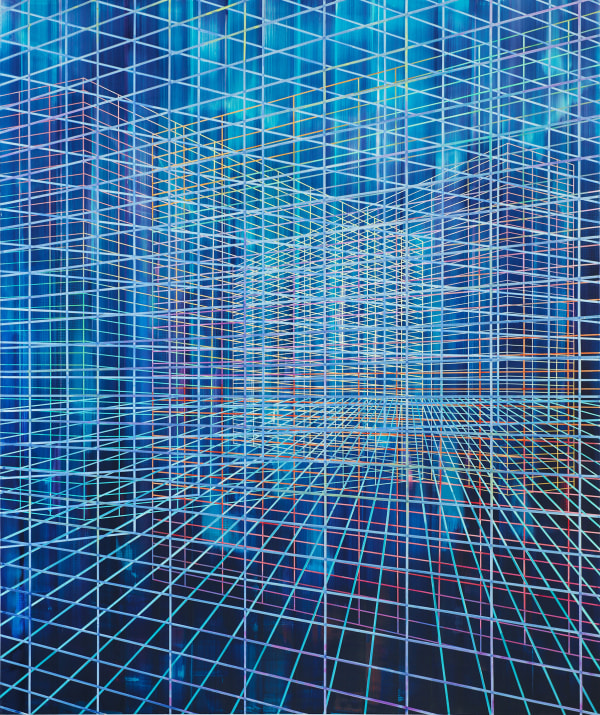

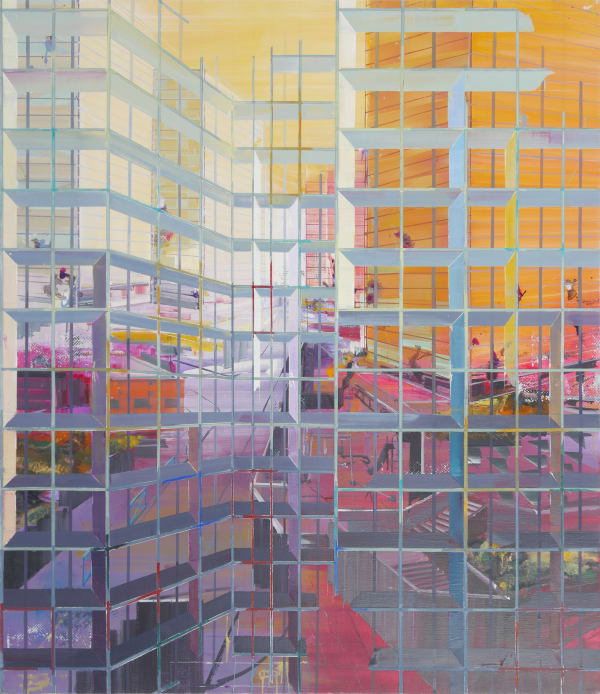
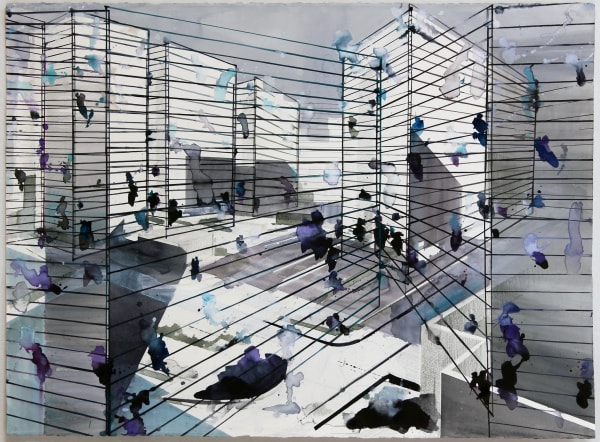

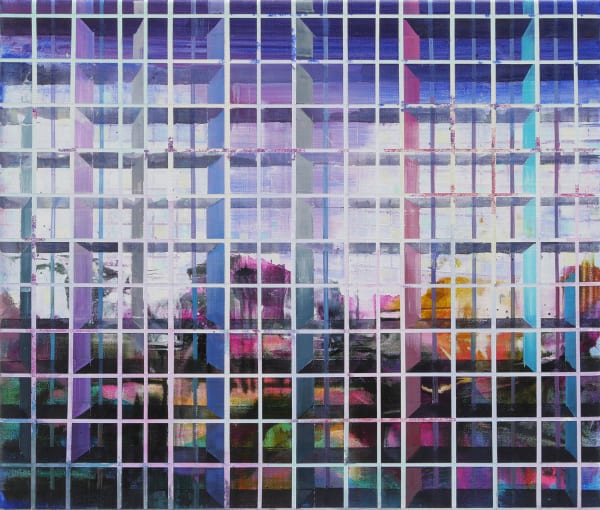


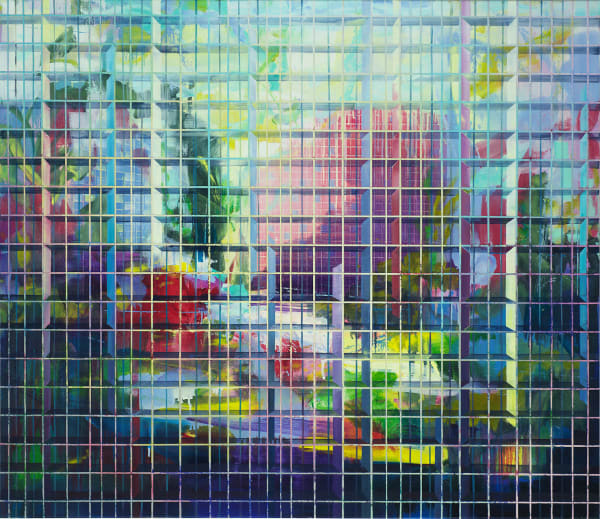

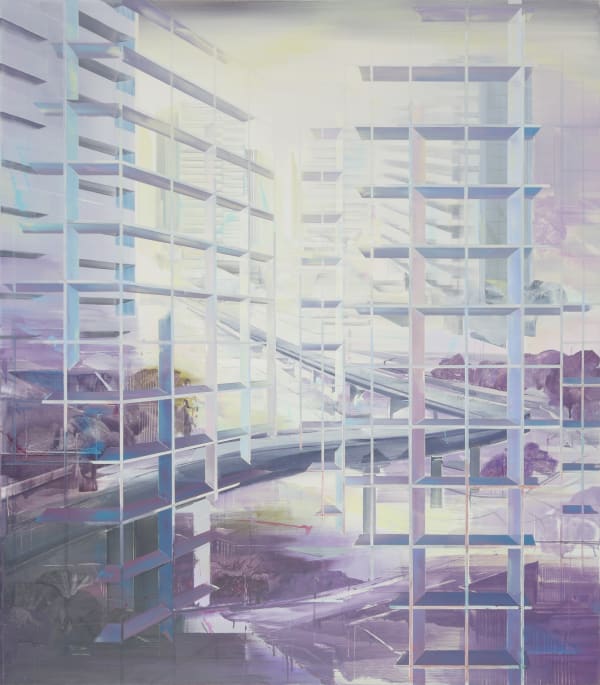
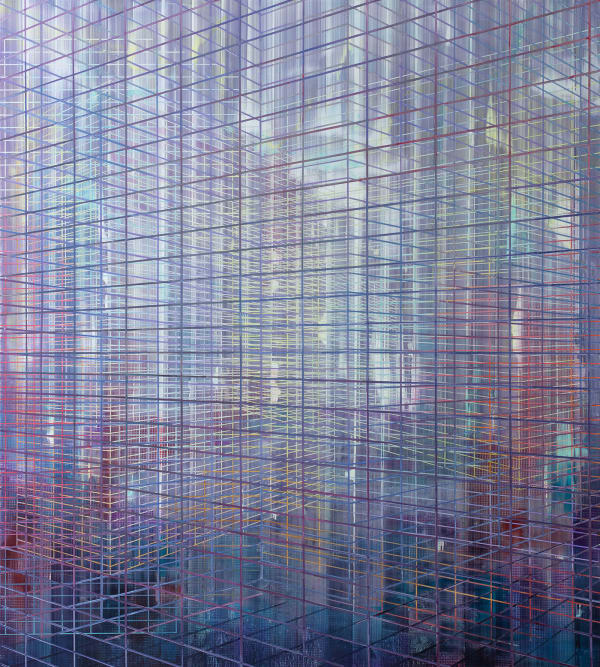











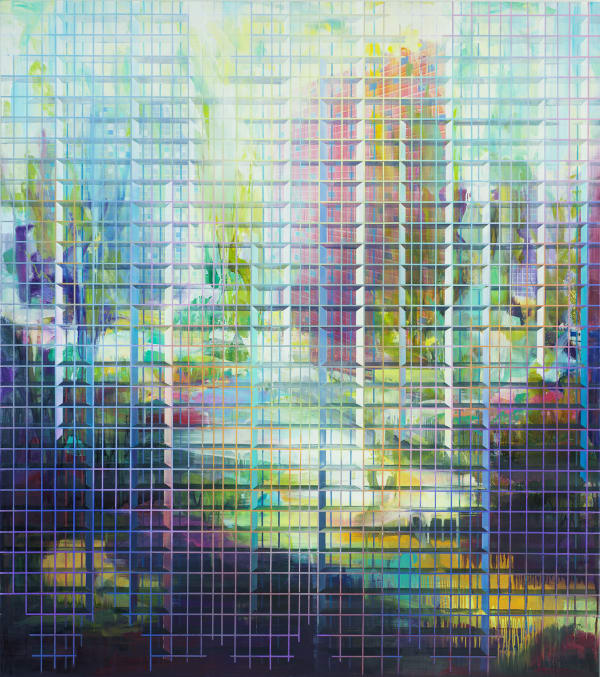


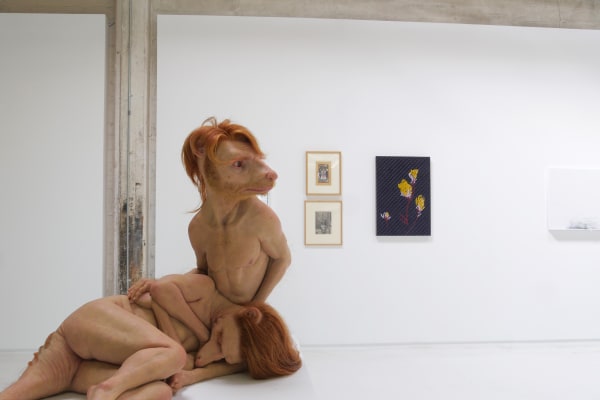
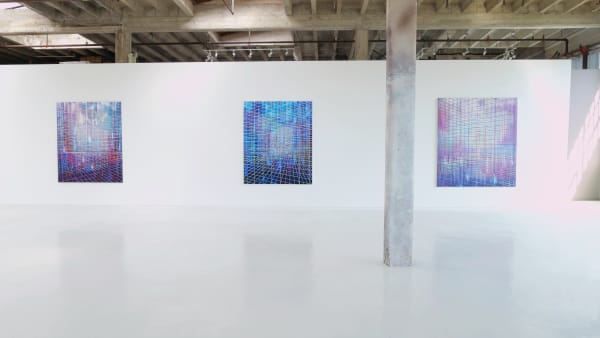













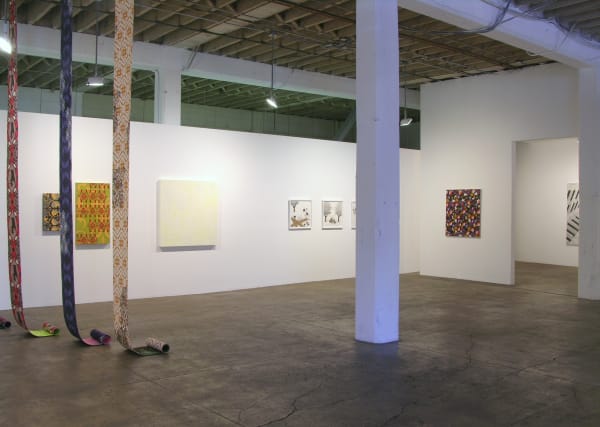


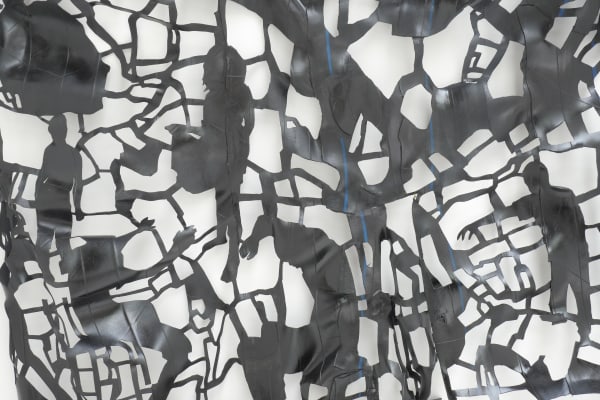
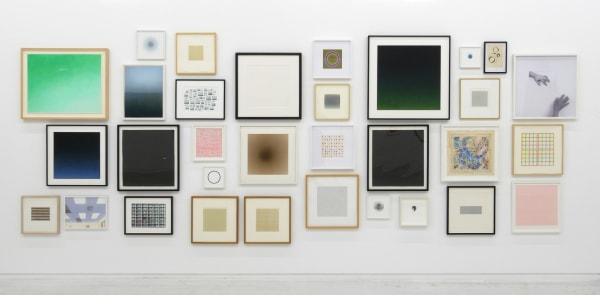

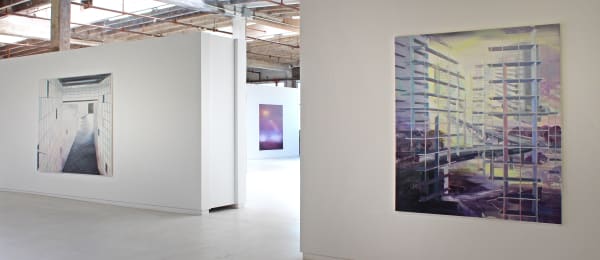
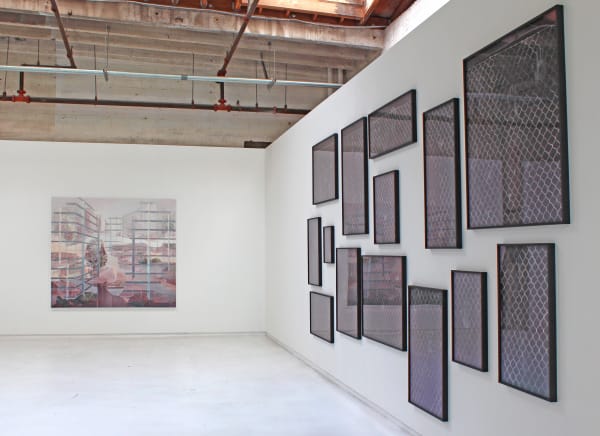
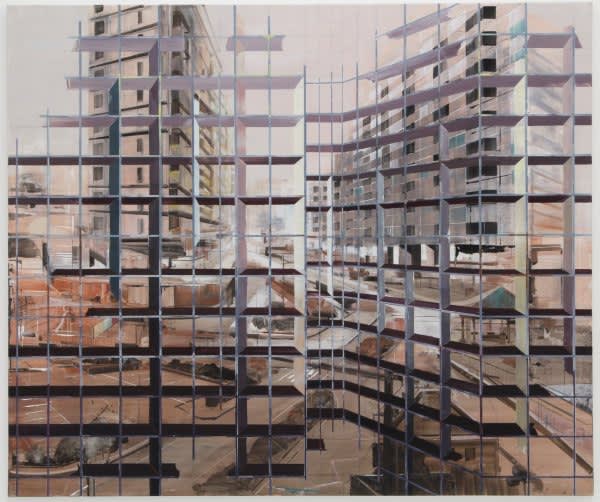
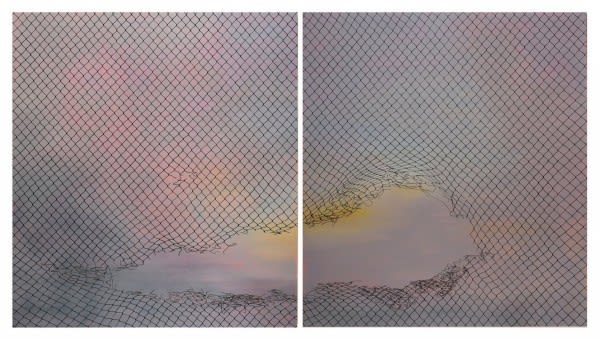





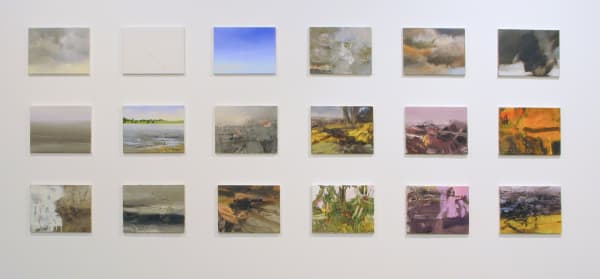
![Driss Ouadahi, "Untitled [j]," 2007, watercolor on paper, 9 5/16 x 13 5/16 inches](https://artlogic-res.cloudinary.com/w_600,c_limit,f_auto,fl_lossy,q_auto/ws-hosfeltgallery2/usr/images/press/main_image/items/76/761fa6cf6af544b88bfb7d393ee02185/edaf040151ce95d376d2a49496285fff82784c4d.jpg)
